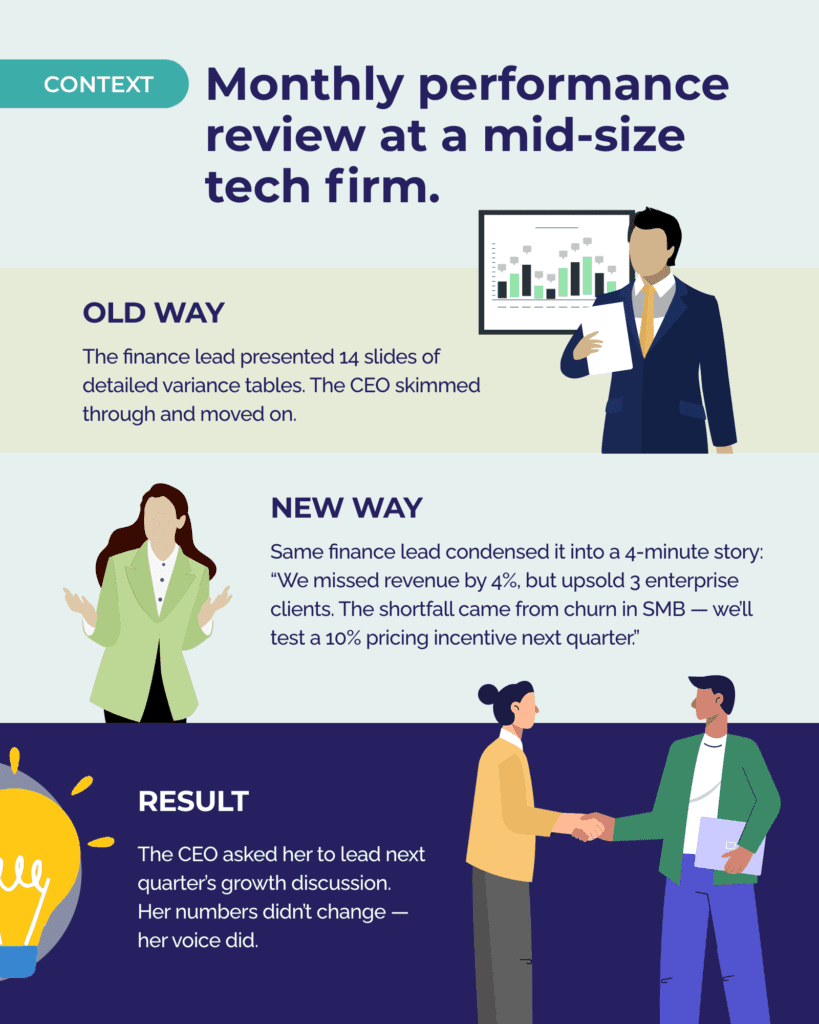The CFO Skill no AI can automate: Your Voice

Strategy beats spreadsheets: why your voice drives influence
Your spreadsheet won’t get you in the boardroom.
Your strategic voice will.
Finance leaders who speak with conviction shape direction, not just report on it.
Early in my career, I thought being technically perfect was the goal.
Then I realized, no one remembers who fixed the formula; they remember who changed the outcome.
Finance is drowning in data.But few voices rise above the noise.
Many analysts become invisible executors. They do great work, but never get heard.
Because technical skill doesn’t equal strategic influence.
👉 These are the skills that separate finance managers from future CFOs, and they’re what we teach inside the Future CFO Program.
Find out how the 12 month virtual program works at the Future CFO Preview Event on 23rd October.
The five truths that separate strategists from technicians:
- Voice > Volume: More data doesn’t create more clarity. Your interpretation does.
- Judgment > Jargon: Great leaders explain complexity simply, not impress with acronyms.
- Narrative > Numbers: Boards don’t remember decimals; they remember the story behind them.
- Trust > Tasks: Strategy starts when people trust your perspective, not your spreadsheet.
- Timing > Talent: Speaking up at the right moment creates influence faster than perfection ever could.
Here’s a 7-step playbook to grow your strategic voice, even if you’re still perfecting your technical craft.
1. Define the decision. Before building a model or deck, ask: What decision will this inform? Every number should serve a purpose, not just fill a cell.
2. Translate data into intent. Replace “Revenue dropped 8%” with “We lost share in our most profitable segment.” Decision-makers need context, not just results.
3. Anchor to impact. Always connect metrics to business outcomes, profit, risk, customer retention, or investor confidence. That’s where influence starts.
4. Speak before it’s perfect. Your insight matters more than your formatting. Leaders value timely judgment over polished decks that arrive too late.
5. Build your pattern library. Keep a note of your best commentaries, insights, and questions. Over time, these form your “voice”, the patterns people start associating with your judgment.
6. Rehearse your narrative. Before presenting, write a one-line version of your insight:
“Our gross margin fell 2 points, but we protected cash, which buys us another quarter of growth runway.” If your one-liner lands, your story will too.
7. Reuse and refine. Save your best phrasing, visuals, and explanations as templates. Strategic voice grows from repetition, not reinvention.
Micro-prompt for practice:
“You are my finance business partner. Using last quarter’s results, summarize the three most important insights for the CEO, propose two actions, and phrase it in under 150 words.”
Run it, review it, refine it. You’ll sound more like a strategist every week.

Your Technical Skills Got You Here.
Your Strategic Voice Will Take You Further.
You don’t build influence by knowing every formula. You build it by knowing when to speak — and what to say when you do.
At GrowCFO, we’ve helped thousands of finance leaders make that transition — from technical expert to trusted strategic partner.
👉 If you want to see how the Future CFO Program helps you develop those skills, join the Future CFO Preview Event on 23rd October. You’ll:
- See how the program works and what’s included across its nine modules
- Hear how other finance leaders have used it to accelerate their careers
- Meet your potential cohort peer group
This isn’t a training session — it’s your chance to explore whether the program is right for you.
📅 Future CFO Preview Event — 23rd October 🎟️ Reserve your free seat here
Because the next stage of your finance career isn’t about perfecting spreadsheets. It’s about finding your voice.

P.S. If you’ve ever struggled to “sound strategic,” start with this habit:
After every report you write, add one line that starts with “This means we should…”
That’s how insight becomes leadership.



